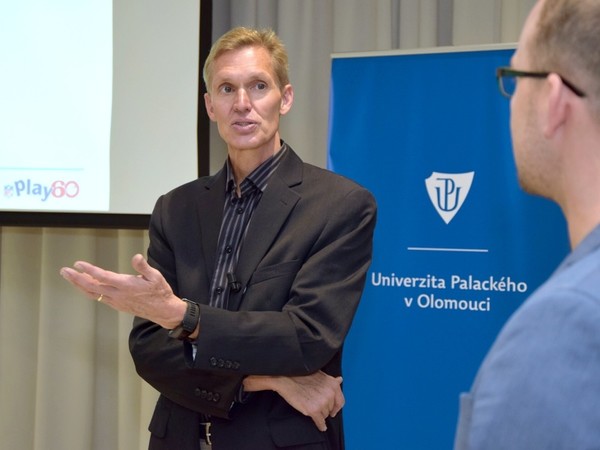The Faculty of Physical Culture welcomed a distinguished guest. Its representatives met with Associate Professor Gregory J. Welk of Iowa State University regarding participation in an emerging worldwide network of workplaces focussing on research into the physical activity of children and youth. Welk also gave two lectures during his visit in which he presented his research topics.
“A Memorandum on Cooperation is being drawn up, and Assoc Prof Welk is quite willing in this respect. We spoke especially about research cooperation in connection with localisation and calibration of the Youth Activity Profile questionnaire, of which Welk is the author, into the Czech context. The talks led to broader themes, for instance the possibility of exchange placements for doctoral students or possible joint research projects. The discussions were beneficial and very promising for our faculty,” summarised František Chmelík, Vice-Dean for Science and Research, regarding the talks.
It was Karel Frömel, head of the Active Lifestyle Institute, who made contact with Assoc Prof Welk, one of the most recognised experts in the area of monitoring physical activity. At Iowa State University, he is the head of his own laboratory, where he dedicates himself to the use of various types of devices for monitoring and evaluating physical activity and devising preventative movement interventions. He also works as the research director of the programme FitnessGram for children and youth at the Cooper Institute in Dallas, where physical fitness is tested and evaluated.
His work attracted more than a hundred listeners to his lectures, which capped the Faculty of Physical Culture’s International Teaching Week. “I was intrigued, among other things, by the idea of instruments for monitoring physical activity. All the manufacturers use their own equations for calculating the extent of activity performed, and their measured values are quite different. If we were to introduce a common unit, we could arrive at a point where the volume of physical activity carried out would become one of the health level indicators, similar for instance to measuring blood pressure during a medical check-up,” said Lukáš Jakubec, from the Active Lifestyle Institute.
